 Early last week, with little attention in the media, the U.S. 10th Circuit Court of Appeal applied the brakes, for now, to one of the newest voter suppression schemes on the bleeding front edge of the GOP's ongoing War on Voting.
Early last week, with little attention in the media, the U.S. 10th Circuit Court of Appeal applied the brakes, for now, to one of the newest voter suppression schemes on the bleeding front edge of the GOP's ongoing War on Voting.
The insidious new Republican scheme, if it manages to overcome continuing challenges in court, such as the stay and appeal it now faces in the 10th Circuit, could result in thousands of otherwise eligible voters in Kansas and Arizona (and elsewhere, if the effort is allowed to move forward in KS and AZ) unable to even register to vote, much less cast a ballot on Election Day.
An investigative report by the Arizona Republic last year found the evidence for the purported basis of the new law --- claims by Republicans that non-citizens are casting ballots in the state --- to be "nearly non-existent".
Judith Brown Dianis, a civil rights litigator at The Advancement Project, described the nearly decade-long, coordinated, nationwide GOP voter suppression effort as "the largest legislative effort to roll back voting rights since the post-Reconstruction era". While appearing before a U.S. Senate Subcommittee in 2011, she described the effort as one designed to make "it harder to register to vote, harder to cast a ballot and harder to have a vote counted."
One of the primary GOP efforts to make it "harder to cast a ballot" can be found in the spate of polling place Photo ID laws that Republicans have sought to justify on the basis of what amounts to a phantom menace. Cases of in-person voter impersonation --- the only type of voter fraud that can be prevented by Photo ID --- are about as scarce as hen's teeth.
The same can be said about baseless GOP claims of an epidemic of voter fraud in the form of votes cast by non-citizens --- an allegation that is now being used as part of the new Republican ploy to prevent perfectly lawful citizens from even registering to vote...
'Papers Please'
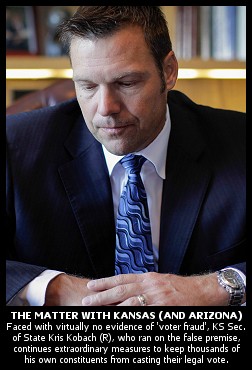 During the run-up to the 2012 Presidential Election, The BRAD BLOG exposed the failed effort by FL Gov. Rick Scott (R) and his handpicked Republican Sec. of State Scott Detzner to purge as many as 182,000 perfectly legal voters as "potential" non-citizens. That effort was based upon vastly exaggerated claims of non-citizen voting and outright lies about a supposed denial of access to a federal immigration database.
During the run-up to the 2012 Presidential Election, The BRAD BLOG exposed the failed effort by FL Gov. Rick Scott (R) and his handpicked Republican Sec. of State Scott Detzner to purge as many as 182,000 perfectly legal voters as "potential" non-citizens. That effort was based upon vastly exaggerated claims of non-citizen voting and outright lies about a supposed denial of access to a federal immigration database.
Faced with a near-certain injunction, Scott and Detzner assured a federal judge that they had abandoned their ill-conceived purge, only to proclaim victory when the court declined to issue an injunction because it was no longer needed.
More recently, we described how Republican Kris Kobach, the man who wrote Arizona's "Papers Please" law before successfully running for Kansas Secretary of State in 2010 on a duplicitous promise of stamping out "voter fraud," helped to ram a "Papers Please" voter registration law through the GOP-dominated Kansas legislature. The statute, if allowed to move forward, threatens to prevent some 17,500 of that state's citizens from becoming registered voters.
Despite an adverse ruling by the U.S. Supreme Court and a refusal by the U.S. Elections Assistance Commission (EAC) to approve their voter-disenfranchising "proof of citizenship" registration scheme --- one that would require new registrants to include documents proving citizenship, in addition to the approved federal voter registration form, which does not, as of now, contain a "proof of citizenship" requirement --- Arizona and Kansas obtained a court order from a George W. Bush appointee, sitting as a U.S. District Court Judge in the Koch brothers' home state, to move forward with their scheme.
Adopting an argument made by another former Bush appointee that is so far off the right side of the playing field that it is at odds with a controlling SCOTUS opinion authored by Justice Antonin Scalia, the Bush-appointed Kansas district court judge first ordered the EAC to immediately approve the GOP "proof of citizenship" requirements on the federal registration form, and then refused to issue a stay pending appeal.
By issuing an Order [PDF] last week, granting the EAC's Motion for an Emergency Stay and Expedited Consideration [PDF], the U.S. 10th Circuit Circuit essentially told the GOP would-be vote suppression gang, 'not so fast'.
NVRA
"Congress," according to the U.S. Department of Justice, "enacted the National Voter Registration Act of 1993 (also known as the "NVRA" and the "Motor Voter Act"), to enhance voting opportunities for every American."
As noted by the EAC in its successful motion for an emergency stay, "the NVRA provides that the federal government 'shall develop a mail voter registration application form for elections for Federal office'...It must do so 'in consultation with the chief election officers of the States...States, in turn, must 'accept and use'...the Federal Form, in registering voters for federal elections by mail."
The statute expressly provides that the Federal Form [emphasis added] "may require only such identifying information . . . as is necessary to enable the appropriate State election official to assess the eligibility of the applicant and to administer voter registration and other parts of the election process." The NVRA also states that the form "may not include any requirement for notarization or other formal authentication." However, the statute also mandates that the Federal Form "include a statement that...specifies each eligibility requirement" [and must contain] "an attestation [signed under penalty of perjury] that the applicant meets each such requirement."
As amended by the Help America Vote Act of 2002 [HAVA], the NVRA mandates that the Federal Form include two check boxes for the applicant to indicate, under penalty of perjury, whether he or she is a U.S. citizen and whether he or she meets the age requirement to vote.
To the Right of Scalia
As The BRAD BLOG reported last year, the Supreme Court handed down a 7-2 decision in Arizona v. Inter Tribal Council of Arizona [PDF] (2013). The ruling struck down an Arizona ballot measure that imposed a similar "proof of citizenship" requirement in order to register to vote in a federal election. The Court ruled that, by reason of the Elections Clause (Art. I §4 of the U.S. Constitution), Congress has the power to preempt state regulations governing the "Times, Places and Manner" of holding federal elections.
The Court found that the National Voter Registration Act ("NVRA") mandates that states "accept and use" the Federal Form for voter registration in federal elections. Under the federal preemption doctrine, the Federal Form took precedence over the Arizona ballot measure, Proposition 200. Because the Federal Form did not contain a "proof of citizenship" requirement, Arizona's effort, via Prop 200, to impose "proof of citizenship" as a condition precedent to registering to vote in federal elections violated the NVRA.
Writing for the majority, Justice Scalia observed that if a state could "demand of Federal Form applicants every additional piece of information the State requires…the Federal Form ceases to perform any meaningful function, and would be a feeble means of 'increas[ing] the number of eligible citizens who register to vote in elections for Federal office.'"
In Inter Tribal Council, the Supreme Court had before it a significant record as to the adverse impact upon the right of otherwise eligible citizens to vote. The District Court had previously found that between January 2005 and September 2007, "31,000 applicants were 'unable (initially) to register to vote because of Proposition 200." Of those, only 30% or approximately 11,000 were subsequently able to register.
Although the Court struck down the Arizona ballot measure, it also ruled that a state "may request that the EAC alter the Federal Form to include information the State deems necessary to determine eligibility" and "may challenge the EAC's rejection of that request in a suit under the Administrative Procedure Act."
The Challenged EAC Rejection
In both Arizona and Kansas, GOP legislatures passed laws requiring documentary proof of citizenship in federal as well as state elections. Immediately after the Court's Inter Tribal Council decision, both states, sliding through the narrow window Scalia left open for them, asked the EAC to add those state-specific requirements to the Federal Form.
The EAC then received evidence and legal arguments from the two states, from individuals and from a number of advocacy groups, as well as various state and local officials. Amongst the arguments presented was a claim made by the disgraced GOP "voter fraud" fraudster, Hans von Spakovsky, who staked out the position that "the EAC has no authority to refuse to approve state-specific instructions that deal with the eligibility and qualification of voters."
On Jan. 17, 2014 Alice P. Miller, the Chief Operating Officer and Acting Executive Director of the EAC, issued a 46-page opinion and decision (Exhibit "C" to the EAC's Motion to Stay) which, in addition to addressing some unrelated requests for modification of the Federal Form from other states, denied the Arizona/Kansas request to add their respective "proof of citizenship" requirement to the Federal Form.
In its decision, the EAC observed:
The House/Senate conference committee explicitly rejected a "proof of citizenship" requirement, finding it was "not necessary or consistent with the purpose of the Act." Indeed, permitting "registration requirements," the conference committee reasoned, "could effectively eliminate, or seriously interfere with, the mail registration program of the Act."
Von Spakovsky, Kansas and Arizona all argued that once the EAC receives a state request to modify the Federal Form it must act as nothing more than a rubber stamp and approve it.
The EAC disagreed, stating, "as the Court explained in Inter Tribal Council, the EAC is obligated to grant such requests only if it determines, based on the evidence in the record, that it is necessary to do so in order to enable state election officials to enforce their states' voter qualifications."
The EAC expressly found that the evidence failed "to establish that registration of non-citizens is a significant problem in either state." Setting aside the contention made by intervenor groups that the two states exaggerated their claims as to the number of non-citizens who allegedly registered to vote, the EAC observed:
At the time Proposition 200 took effect in January 2005, there were 2,706,223 active registered voters in Arizona. Thus Arizona’s evidence at most suggests that 196 of 2,706,223 registered voters, approximately 0.007 percent, were unlawfully registered noncitizens around the time that Proposition 200 took effect.
Recall that the District Court found, in Inter Tribal Council, that Prop 200 had disenfranchised more than 30,000 lawful citizens in order to prevent, at most, 196 illicit non-citizen registrations (which, by the way, is not the same thing as 196 illicit ballots actually cast, since most such registrations are found to have been filed in error.)
By contrast, the EAC expressly found that the states' "proof of citizenship" requirements "would hinder voter registration for federal elections...thwart organized voter registration programs," and that it was entirely unnecessary given the alternative means for addressing the problem, including criminal prosecutions and access to state and federal databases.
A Friendly Venue?
Arizona and Kansas filed the federal lawsuit, challenging the EAC's rejection of their request, in the same state in which the headquarters of Koch Industries is located. The Koch-funded American Legislative Exchange Council (ALEC) has been found to have been a driving force behind the spate of GOP voter suppression laws in recent years.
In his March 19 decision (Exhibit "A" to the EAC's Motion for a Stay), Judge Eric F. Melgren, a George W. Bush appointee to the U.S. District Court in Kansas, agreed with von Spakovsky and friends, and ruled that EAC approval of the states' request to add the requirement for documentation of citizenship to the federal form is simply a ministerial function.
Since the "Arizona and Kansas legislatures have decided that a mere oath is not sufficient to effectuate the citizenship requirements and that concrete proof of citizenship is required to register to vote," Judge Melgren reasoned that state determinations were binding upon the EAC because the Qualifications Clause of the U.S. Constitution "gives the states exclusive authority to set voter qualifications." Melgren also later issued an order refusing to grant a stay of his decision, even pending an appeal from the EAC.
Von Spakovsky's Qualifications Clause analysis, which Judge Melgram found convincing, does not present a novel argument. The Supreme Court already had expressly considered it when they ruled against Arizona in Inter Tribal Council on the identical "qualification" issue contained in Prop 200's "proof of citizenship." All states include "citizenship" as a "qualification" to voting eligibility. The question is whether "proof of citizenship" is necessary to enforce that qualification.
If, as Von Spakovsky and Judge Melgram contend, the EAC's role is merely that of a rubber stamp, then states could "demand of Federal Form applicants every additional piece of information the State requires." That, according to Justice Scalia, would gut the very purpose of the NVRA.
Von Spakovsky's argument did not merely seek to snatch victory from the jaws of SCOTUS defeat. It seeks to proclaim victory while churning in the very bowels of defeat. Or, at least, in the bowels of an already rejected GOP voter suppression scheme.
Significance of Appellate Court Stay
In its recent, successful appellate motion, the EAC sought both a "stay pending appeal" and asked the "Court to consider this important appeal on an expedited basis."
In its May 20 order, the 10th Circuit, despite having received the states' lengthy Opposition to the Motion for a Stay [PDF], granted both requests, concluding "Appellants have made the requisite showing."
While that is not the same as a final ruling on the merits, it is significant because one of the factors that is a part of the "requisite showing" is a "likelihood of success on the merits." Here, the EAC made a significant showing as to how the argument, first advanced by one former Bush appointee, von Spakovsky, and then adopted by another, Judge Melgren is flat-out wrong when measured against the Constitution, the NVRA, EAC regulations, the Supreme Court's decision in Inter Tribal Council, as well as the 9th Circuit's decision in that same case, in which the court found: "While states may suggest changes to the Federal Form, the EAC has the ultimate authority to adopt or reject those suggestions."
As the "proof of citizenship" requirement cannot take effect unless and until it is approved by the EAC, the stay has the effect of barring the "proof of citizenship" requirement as a condition precedent to registration unless and until the 10th Circuit were to rule in favor of Kansas and Arizona.
Given that the 10th Circuit granted the motion to expedite consideration of the case, and that the EAC has already filed its opening brief, it is anticipated that the court will hand down a decision before the 2014 general election.
While it appears unlikely, if Kobach and friends are successful, one could expect the scheme to spread to other Republican-run states like wildfire. If it's rejected, one should not be surprised to find ALEC and the GOP looking to invent still new schemes to undermine the very core of our representative democracy: the right to vote.


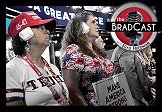 Former MAGA 'Cultist' on the State of the Race for 'MAGA Americans': 'BradCast' 7/23/24
Former MAGA 'Cultist' on the State of the Race for 'MAGA Americans': 'BradCast' 7/23/24  'Green News Report' 7/23/24
'Green News Report' 7/23/24
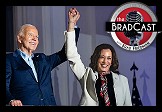 Biden Out, Endorses
Biden Out, Endorses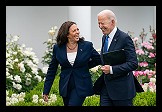 BIDEN DROPS REELECTION BID
BIDEN DROPS REELECTION BID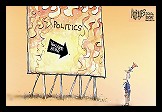 Sunday 'You Are Here' Toons
Sunday 'You Are Here' Toons What J.D. Vance Forgot to Tell You (and Lied About) at the RNC: 'BradCast' 7/18/24
What J.D. Vance Forgot to Tell You (and Lied About) at the RNC: 'BradCast' 7/18/24 'Green News Report' 7/18/24
'Green News Report' 7/18/24 Holding on for Dear Life Amid the Political Whirlwind: 'BradCast' 7/17/24
Holding on for Dear Life Amid the Political Whirlwind: 'BradCast' 7/17/24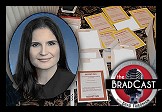 Cannon's Corruption: 'BradCast' 7/16/24
Cannon's Corruption: 'BradCast' 7/16/24 'Green News Report' 7/16/24
'Green News Report' 7/16/24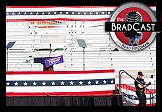 Amid the Assassination Attempt Aftermath:
Amid the Assassination Attempt Aftermath:
 Meanwhile... : 'BradCast' 7/11/24
Meanwhile... : 'BradCast' 7/11/24 'Green News Report' 7/11/24
'Green News Report' 7/11/24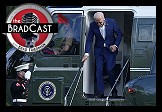 Paging 'Johnny Unbeatable'! Dems (Actually!) in Disarray!: 'BradCast' 7/10/24
Paging 'Johnny Unbeatable'! Dems (Actually!) in Disarray!: 'BradCast' 7/10/24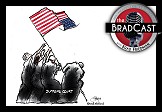 SCOTUS Immunity Ruling 'As Bad as it Sounds', And Worse: 'BradCast' 7/9/24
SCOTUS Immunity Ruling 'As Bad as it Sounds', And Worse: 'BradCast' 7/9/24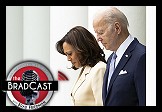 So, What Now?: 'BradCast' 7/8/24
So, What Now?: 'BradCast' 7/8/24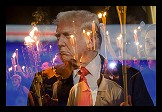 Debunking MAGA Cult Xenophobia
Debunking MAGA Cult Xenophobia A Friendly Suggestion: Harris-Newsom 2024
A Friendly Suggestion: Harris-Newsom 2024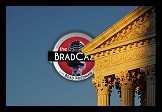 Prosecutor: SCOTUS Corruption Ruling Less Corrupt Than Appears: 'BradCast' 6/27/24
Prosecutor: SCOTUS Corruption Ruling Less Corrupt Than Appears: 'BradCast' 6/27/24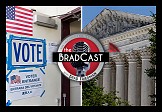 Good News and Bad: At the Polls and From the Corrupted Court: 'BradCast' 6/26/24
Good News and Bad: At the Polls and From the Corrupted Court: 'BradCast' 6/26/24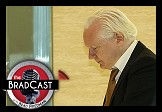 'Emptywheel' on Assange Hacking, Plea Deal: 'BradCast' 6/25/24
'Emptywheel' on Assange Hacking, Plea Deal: 'BradCast' 6/25/24
 VA GOP VOTER REG FRAUDSTER OFF HOOK
VA GOP VOTER REG FRAUDSTER OFF HOOK Criminal GOP Voter Registration Fraud Probe Expanding in VA
Criminal GOP Voter Registration Fraud Probe Expanding in VA DOJ PROBE SOUGHT AFTER VA ARREST
DOJ PROBE SOUGHT AFTER VA ARREST Arrest in VA: GOP Voter Reg Scandal Widens
Arrest in VA: GOP Voter Reg Scandal Widens ALL TOGETHER: ROVE, SPROUL, KOCHS, RNC
ALL TOGETHER: ROVE, SPROUL, KOCHS, RNC LATimes: RNC's 'Fired' Sproul Working for Repubs in 'as Many as 30 States'
LATimes: RNC's 'Fired' Sproul Working for Repubs in 'as Many as 30 States' 'Fired' Sproul Group 'Cloned', Still Working for Republicans in At Least 10 States
'Fired' Sproul Group 'Cloned', Still Working for Republicans in At Least 10 States FINALLY: FOX ON GOP REG FRAUD SCANDAL
FINALLY: FOX ON GOP REG FRAUD SCANDAL COLORADO FOLLOWS FLORIDA WITH GOP CRIMINAL INVESTIGATION
COLORADO FOLLOWS FLORIDA WITH GOP CRIMINAL INVESTIGATION CRIMINAL PROBE LAUNCHED INTO GOP VOTER REGISTRATION FRAUD SCANDAL IN FL
CRIMINAL PROBE LAUNCHED INTO GOP VOTER REGISTRATION FRAUD SCANDAL IN FL Brad Breaks PA Photo ID & GOP Registration Fraud Scandal News on Hartmann TV
Brad Breaks PA Photo ID & GOP Registration Fraud Scandal News on Hartmann TV  CAUGHT ON TAPE: COORDINATED NATIONWIDE GOP VOTER REG SCAM
CAUGHT ON TAPE: COORDINATED NATIONWIDE GOP VOTER REG SCAM CRIMINAL ELECTION FRAUD COMPLAINT FILED AGAINST GOP 'FRAUD' FIRM
CRIMINAL ELECTION FRAUD COMPLAINT FILED AGAINST GOP 'FRAUD' FIRM RICK SCOTT GETS ROLLED IN GOP REGISTRATION FRAUD SCANDAL
RICK SCOTT GETS ROLLED IN GOP REGISTRATION FRAUD SCANDAL VIDEO: Brad Breaks GOP Reg Fraud Scandal on Hartmann TV
VIDEO: Brad Breaks GOP Reg Fraud Scandal on Hartmann TV RNC FIRES NATIONAL VOTER REGISTRATION FIRM FOR FRAUD
RNC FIRES NATIONAL VOTER REGISTRATION FIRM FOR FRAUD EXCLUSIVE: Intvw w/ FL Official Who First Discovered GOP Reg Fraud
EXCLUSIVE: Intvw w/ FL Official Who First Discovered GOP Reg Fraud GOP REGISTRATION FRAUD FOUND IN FL
GOP REGISTRATION FRAUD FOUND IN FL


































